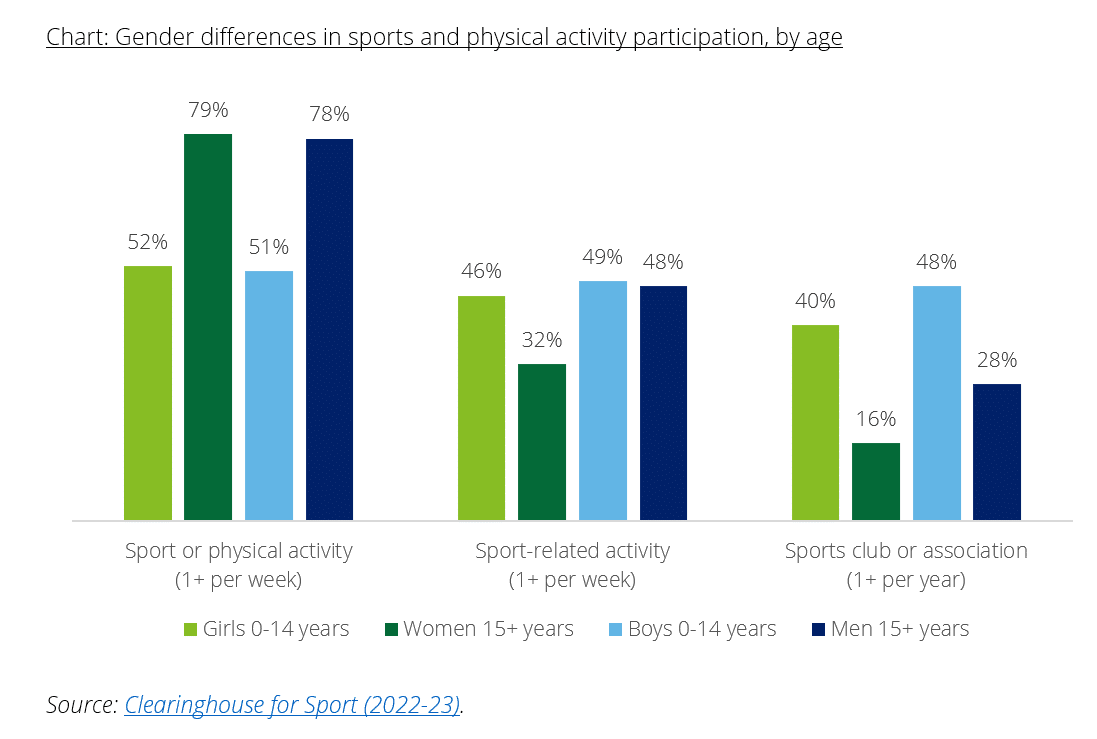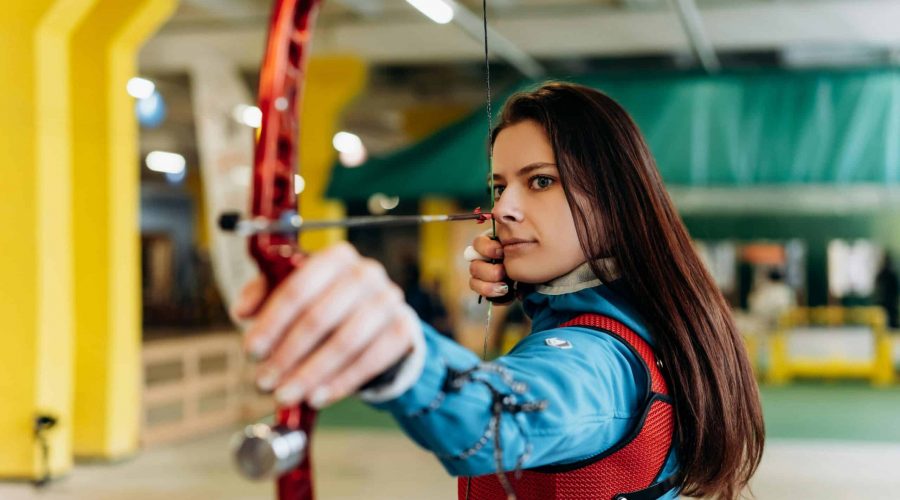Women won 13 out of Australia’s 18 gold medals at the 2024 Paris Olympics – that’s 72%. Despite these positive strides, there’s an uncomfortable disconnect between the amazing feats of our women Olympians, and the ongoing battle for gender equality affecting women’s sport.
In this article Deloitte Manager Evie Fox Koob explores the subject of gender equality in women’s sport plus she reveals the actions needed to drive real progress.
A recent Women in Economics Network webinar explored women’s sport and equality with the help of an experienced panel of experts, who I have quoted throughout this article.[1]
Some of the answers lie in the specific environment of the sports world – at the community, grassroots level as well as at the elite, professional level – while broader gender norms in our society and culture also make a significant contribution.
Starting with community sports, even though many girls participate in sport, and women enjoy exercise as much as men do, girls typically drop out of sport by the age of 15 – particularly organised or club sport.
Australian data in the chart below shows that young girls and boys are similarly likely to undertake sport-related activity each week, but there is already an eight-percentage point gap in sports club or association participation (40% for girls and 48% for boys).
And while nearly 80% of men and women undertake some form of exercise each week, only 32% of women participate in sport compared to 48% of men, and 16% and 28% of women and men respectively are involved in sports clubs or associations.

Research indicates that girls drop out of sport for a range of reasons – they don’t have women role models, are concerned about inequality in sport, have fewer opportunities (like women’s teams), and are worried about body confidence and having time for studying.
Another issue that begins in the teenage years is safety. Our knowledge base on women’s physical development as athletes is lacking, and coaching is untailored to gender differences. This contributes to a significant gender gap in sports-related injuries. For example, women are two to eight times more likely than men to injure their ACL, which can take more than a year to recover from (as any fellow Matildas fan knows all too well after Sam Kerr’s 2024 ACL injury).
For those women who manage to push past the barriers in community sports and seek a career in professional sports, unfortunately the picture isn’t much rosier – whether we’re looking at career opportunities (progression and leadership), pay or general treatment.
Professional women’s sport organisations are overwhelmingly run by men. Of the 65 National Sporting Organisations funded by the Australian Sports Commission (ASC), 22% of CEOs are women. And even though 56% of workers in the Sports and Recreation Activities industry are women, 14% of CEOs are women (compared to 22% nationally), and 13% of Board Chairs are women (compared to 19% nationally).
Beyond these traditional markers of representation, the gender dynamics of coaching are particularly important in sport. Coaches are the fundamental levers of success in sport, but as Brian Canavan (NRL consultant) puts it, “Despite growth in female participation numbers there has not been commensurate growth in coaches… We don’t equip them or prepare them well.”
Women make up just 9% of high-performance coaches in Australia. Experienced Basketball Coach Cassie Dover said “In the NBL 1, only 3 of 28 coaches are women. In my 16 years in professional sport, I never had a female head coach at an elite level.”
The implications of this divide are significant, with women athletes having few role models to look up to, and the few women who are successful as coaches facing significant backlash and harassment.
“Sport has evolved and society has evolved, but coaching has remained static,” said Annabelle White (Coaching Advisor at the ASC). “The National Coaching Accreditation Scheme was introduced in 1979 and wasn’t retired until 2016. In that time coaching didn’t evolve to reflect the diverse participant base need.”
The workplace environment is often not much better for athletes than coaches, despite the increasing attention on women’s sport from fans and investors. “Female athletes at the senior level have professional expectations and are professionally presented, but they are operating in a semi-professional environment, particularly when it comes to pay,” said Brian Canavan.
Women athletes still typically earn significantly less than their male counterparts, and can struggle to balance motherhood with the high demands of elite sport, like time and travel. As Cassie Dover noted, “It would be great if more was done so women didn’t have to delay having a family to meet sport career goals.”
Taken together, there’s clearly a lot to do to translate the hope and success of the Olympics podium to the everyday lives of women athletes. Much can be done at a systemic level, as articulated by Annabelle White: “We’ve had 145 national policies over the last 10 years on gender equity in sport. These have not had impact. We need to look at sport communities holistically. It’s just not about elevating women, we need to address the environmental factors holding them back.”
Notably, many of the barriers facing women in sport reflect those in the broader fight for workplace and economic equality – participation, pay, leadership, unpaid work, all underpinned by traditional gender norms.
But with seven out of ten people now watching women’s sport, and sponsorship and prize money in women’s sport starting to catch up to that in men’s sport, there is every chance that women’s sport can lead the way. Hopefully the 2028 Olympics see the successes of our exceptional women athletes reflected in the everyday experiences of women in community and professional sports.
Actions to improve gender equality in sport
- Properly commercialise the women’s game and pay women athletes properly (salaries, sponsorship, prize money). For example, Australia was the first of a small number of countries where the national football federation committed to equal pay for men’s and women’s national teams.
- Establish the evidence base on women’s physical development as athletes, including in the teenage years, and translate this into coaching and fitness programs for women athletes.
- Develop coaching career paths and supports for women coaches, both in community and elite clubs. For example, the ASC’s Women’s Mentor Pilot Program supports women leaders in coaching positions to lead change and is having impact. As Cassie Dover put it: ““The ASC Women’s Mentor inspired me to continue and support others in their pathways.”
- Share authentic stories of women and girls in sport, including in the media.
- Give women’s sports more airtime.
- Work on making the sporting environment and culture safer and more accessible for a diverse array of athletes and leaders.
- Call out gender stereotypes, or as Annabelle White said: “Everyone plays a significant role in challenging others’ and own perspectives. We need active allies including men who can step up and who also know when to step back and give women an opportunity to be heard.”
- Shift the traditional structure of professional sports roles and competitions such that parents can balance looking after children with the time and travel demands of the jobs.
- Fund reporting and support mechanisms for violence and harassment in sport (alongside preventive programs).
- Implement best practice workplace equality actions in sporting organisations, such as targets for women in leadership (including in coaching, officiating, and judging).
[1] The full panel included Dr Hannah Altman (Lecturer at QUT, PhD in Health & Sports Economics), Annabelle White (Coaching Advisor, Australian Sports Commission), Cassie Dover (Basketball Coach, Indigenous Basketball Association volunteer and Yugambeh woman), Brian Canavan (NRL consultant, Senior coach professional development), and Courtney Pascoe (Powerlifting referee).
Financy is a technology company that provides data insights through the Financy Women’s Index and empowers business leaders to take action on Diversity, Equity and Inclusion through the IMPACTER platform.












